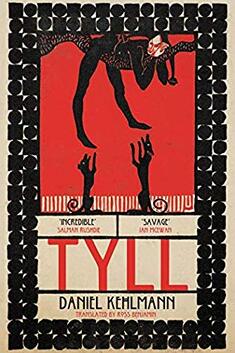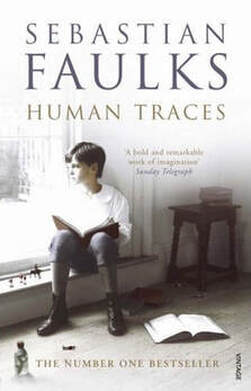Tyll by Daniel Kehlmann translated by Ross Benjamin
Forced to flee the dubious protection of the village, Tyll goes on the road as a travelling entertainer criss-crossing a war-ravaged land. Battling hunger, cruelty, courts and cannonballs, he hones his craft. But while acclaimed for his singing, dancing, acting and juggling, he has a demonic streak. Perhaps he needs it to survive.
According to the blurb, Daniel Kehlmann has taken a legend from mediaeval German folklore and placed it on the stage of the Thirty Years’ War. Knowing nothing of the former and little more of the latter, I might have missed some of the references, especially as the story doesn’t progress in linear time. The British reader ignorant of European history – or rather this British reader – is helped to get her bearings from an English character, granddaughter of Mary Queen of Scots and grandniece of her namesake Queen Elizabeth I, who, in encouraging her husband to accept the Bohemian throne is instrumental in setting the scene for war.
But even without the unfortunate Liz, at whose much-diminished court Tyll is appointed to the formal role of Fool, I’d have been captivated by the storytelling. As with two recent reads about The Black Death, I particularly enjoyed and admired how the author renders the belief systems of a pre-scientific culture. While there are touches of humour in the spells, superstitions and self-fulfilling prophecies, it’s less schadenfreude than recognition that we also clutch at dubious patterns to defend against painful circumstances we can’t control.
First published in German in 2017, I received my advanced proof copy of the English translation, to be released on February 6th, from the publishers riverrun. For my thoughts on another novel from this author, see my post Fate, Fakery and Finance.
Human Traces by Sebastian Faulks
Thomas has come to doctoring by way of language and literature; Jacques has followed a scientific route, observing and recording and experimenting, and dissecting frogs. But he also wants to find a cure for his older brother Olivier who, after becoming more and more disturbed and disturbing in his teens, has been warehoused in an asylum run by nuns. While the quest is less personal for Thomas – although he later admits to having heard voices himself – he’s equally passionate about unravelling the mystery of the human mind. They share a dream to set up a clinic together when they qualify, to care for the mentally sick and to study what it is to be.
Inspired by the work of William Tuke, pioneer of moral treatment at the York Retreat, Thomas takes a job in a county asylum. Unfortunately, the place is so overcrowded, there isn’t the time or space for the kindly encouragement of ordinary activity Thomas hoped to be in a position to promote. While the medical superintendent is a gentle character, one of Thomas’ peers is not a doctor but the former administrator of a warehouse.
Nevertheless, Thomas works hard and learns his ‘craft’, while conscious that mental illness is an enigma and there’s very little a medical man can do to help. In a spirit of rebellion, he assists a misplaced patient, Daisy, over the wall for an evening in the pub[1]. Thomas isn’t alone in wanting to introduce a shred of normal entertainment: patients and staff come together to organise a Christmas dance[2].
Meanwhile, Jacques is learning about hysteria from Charcot’s lectures-cum-freak-shows at the Salpêtrière in Paris. Before too long, with the help of Thomas’s sister Sonia and a rich benefactor, the young men fulfil their dream and set up a clinic in the Austrian mountains to provide rest cures for the wealthy and a pleasant environment for the potentially incurable, including Jacques’ brother Olivier.
By this time, Jacques, initially the hard scientist, perceives the path to health through the unconscious; Thomas, initially the romantic, is inspired by Darwin and evidence that can be observed. Initially, their interests and orientations are complementary, until Thomas discovers that Jacques has dangerously misdiagnosed a patient’s organic illness as psychological. Resentment simmers until, many years later, Jacques walks out of a public lecture Thomas is giving, hurt that his friend has introduced his own position by ridiculing Jacques’.
Thomas’ thesis is even more controversial, partly inspired by seeing the fossilised footprints of our human ancestors in Tanzania[3]. He argues that hearing voices is a marker of consciousness, a throwback to a period in evolution after the acquisition of language (so that ‘man’ could carry around self-instructions in the form of words in our heads) but before the development of writing (voices be redundant when these instructions could be transcribed). Although Thomas articulates this wacky proposal very well[4], his audience is unconvinced.
Since neither man fulfils his initial promise, this is a novel about failure, as well as about the history of psychiatry, with nods to several key figures in the discipline’s development at the turn of the last century. Alongside his evidently meticulous research, Faulks displays touches of humour, such as when Thomas scoffs at the thinking behind the Oedipal situation, without mentioning Freud, and predicts that neologisms like ‘gene’ and ‘schizophrenia’ will never catch on.
With my own novel, Matilda Windsor Is Coming Home, set in the dying days of the longstay psychiatric hospital, I’m always interested to read about such places in earlier times. But I was recommended this for my series on fictional therapists. Although the period in which it is set predates therapy as we’d recognise it today, both protagonists employ elements contemporary practitioners would recognise: Thomas patiently attempting to connect with Olivier[5]; Jacques exploring beneath the surface of a less disturbed patient’s presenting symptoms. Unfortunately, as revealed in his case report, his overzealous espousal of unconscious causes leads to him imposing (rather than humbly offering) an interpretation and blinds him to simpler medical explanations[6].
At almost 800 pages, this is a big novel exploring big ideas. It’s also – less successfully in my opinion, or it might just be that I’m not enamoured of the genre – a family saga, with roots and branches across four generations. I hoped, when one of the doctor’s sons is packed off to Passchendaele in the First World War, the author might have some interesting insights into the madness of war. But, while shellshock[7] gets a mention, I expect it’s partly there because Sebastian Faulks likes writing about the war.
First published in 2005, I was surprised to find this was the first novel I have read by this prolific English author. I’ll certainly be open to reading his work again.
[1] Sixty or so years on, a psychiatrist is similarly cavalier about boundaries in The Key.
[2] See also The Ballroom by Anna Hope
[3] I loved this part of the novel, having been to the Olduvai Gorge myself.
[4] Faulks acknowledges The Origins of Consciousness in the Breakdown of the Bicameral Mind by Julian Jaynes, which is often cited – and dismissed – in contemporary studies of voice hearing; Charles Fernyhough discusses it in The Voices Within.
[5] Albeit with less success than Dr Fried in I Never Promised You a Rose Garden.
[6] Jonathan Coe does something similar with his arrogant Lacanian analyst in The House of Sleep.
[7] The treatment of which is addressed in Pat Barker’s Regeneration.
| When Charli set the prompt for this week’s flash fiction challenge, I thought I’d add my contribution retrospectively to my previous post reviewing a collection of short stories about protest. But, reflecting on how our fear of mental illness can lead to scapegoating of sufferers, I changed my mind. I like how this 99-word story about a protest is also a protest in itself. |
Although medication dulls my senses, that headline hurts. An assault on language. An assault on me.
When I first acquired the label, I feared it would swallow me whole. Would I still be a person? Or turn into an axe-wielding lunatic overnight?
I upload a screenshot to Facebook. An emoticon scowl. SCHIZOPHRENIC ATTACKS DIABETIC would be more balanced. UNEMPLOYED ACCOUNTANT ATTACKS SHOP ASSISTANT more polite.
The LIKES accumulate. The expressions of rage. We’re more than our diagnoses. More often the target than the perpetrator of abuse.
While social media can be mentally toxic, it’s a place of protest too.
























 RSS Feed
RSS Feed





















